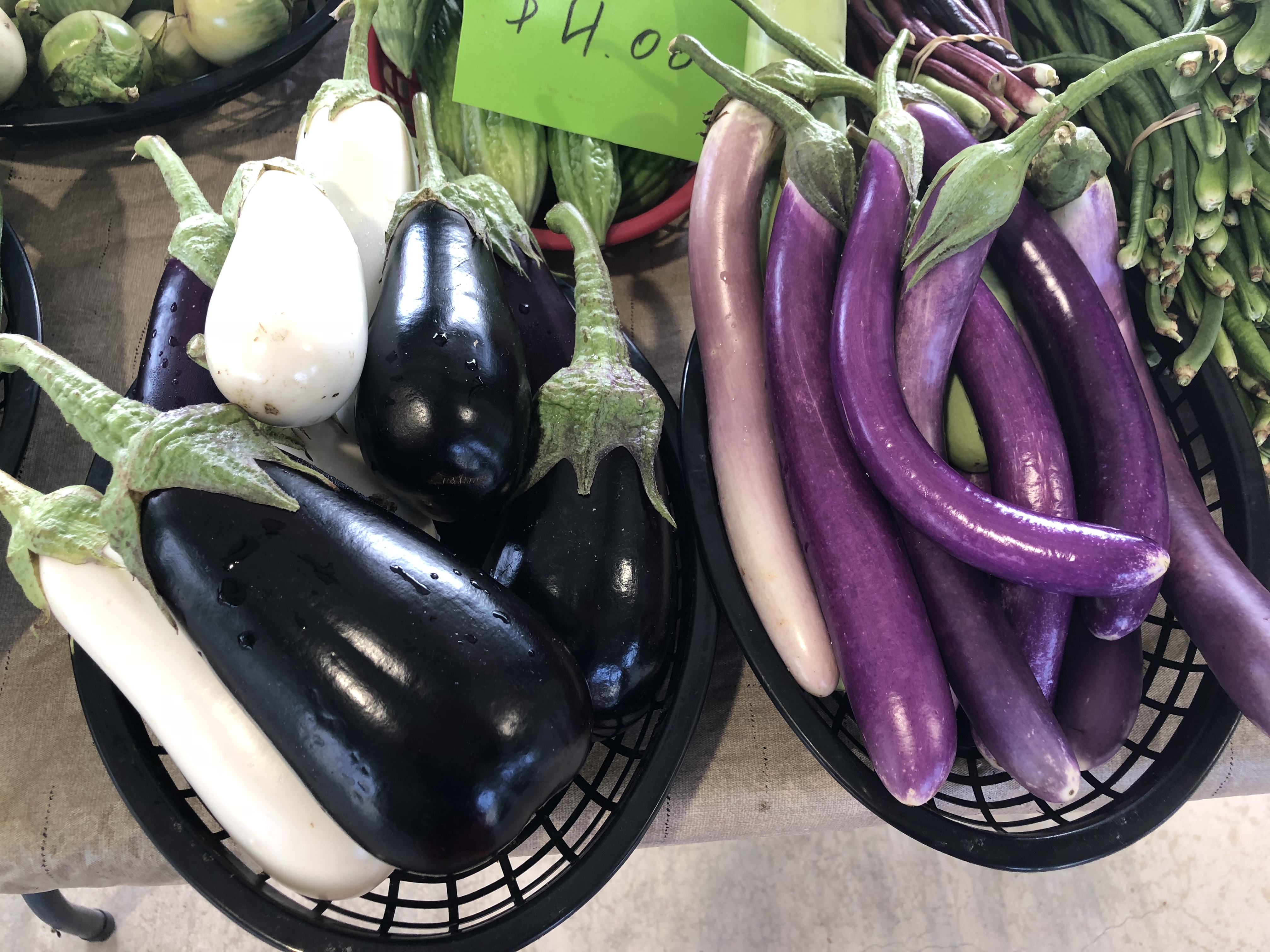Tips for Buying and Cooking the Best Eggplants at the Market
TEXARKANA, Ark. –
Walk through the farmers market and you will likely see vibrant, deep purple, pristine white and small round green eggplant on vendor’s tables. You will soon realize that not every eggplant is the same as you might have perceived: large, oblong, and deep purple. There are countless varieties out there, all unique in their own flavor. But how do you choose the best one?
Look for a smooth and shiny surface that is consistent throughout. If it has a dull skin color, it’s a sign of poor storage or down right bad quality. Wrinkles are a sign that the eggplant is old and was harvested a long time ago, so pass over wrinkly skin in favor of taut, tight eggplants. Also, avoid brown blemishes or soft spots.
You want a little firmness to your eggplant. It should be slightly firm but not hard. If you push on it with your finger and the veggie feels very soft, or you're able to puncture the skin, it's too far gone. A perfectly ripe eggplant will not have as much give when touched as a ripe tomato or peach. A good eggplant should feel heavy for its size.
Look for bright green stems, free and clear of any mold or mushiness; while the skin of the plant may look pert and perky, signs of damage may be lurking around that stem. So check there first.
Some say that eggplant is bitter so they may steer away from it. That isn’t necessarily the truth, if it is picked correctly. Large eggplants can be more bitter and have more seeds, as the vegetable was given more time to mature. So instead of going for the biggest; choose small to medium-sized and well-formed eggplants.
Eggplants are easily damaged and should be handled with care. They can be stored in the refrigerator for a few days with great success Store as soon as possible in the vegetable compartment of your refrigerator, since high humidity is preferred for eggplant storage. If you are not going to store it in the vegetable compartment, it needs to be wrapped loosely in plastic wrap and used within one week of purchase.
As with most fruits and vegetables, wash eggplant just before using. To remove dirt, wash vegetables thoroughly in cold water. Do not use soap, bleach or detergent, as they can be absorbed by the eggplant. Drain and rinse several times with cold water.
Eggplant is a good source of fiber and folate and contains potassium. It is low in calories, with only 30 to 35 for a one cup serving. Fiber helps control cholesterol and keeps you regular. Potassium helps maintain a healthy blood pressure, and folate may reduce the risk of heart disease. Eating foods with folate before pregnancy helps reduce your risk of neural tube defects.
For more information, contact the Miller County Extension Office, 870-779-3609 or visit us in room 215 at the Miller County Courthouse. We're online at cdue@uada.edu, on Facebook at UAEXMillerCountyFCS/CarlaDue, on Twitter @MillerCountyFCS or on the web at uaex.uada.edu/Miller.
Seems that when you hear the word eggplant you think of eggplant parmesan. So here is an easy recipe that takes less than an hour to cook and allows you use that fresh eggplant you bought from the farmers market.
Easy Eggplant Parmesan
- 3 eggplant, peeled and thinly sliced
- 2 eggs, beaten
- 4 cups Italian seasoned bread crumbs
- 6 cups spaghetti sauce, low sodium, divided
- 2 cups mozzarella cheese, shredded and divided
- 1/2 cup grated Parmesan cheese, divided
- 1/2 teaspoon dried basil, or two teaspoons fresh
- Preheat oven to 350 degrees F.
- In one small bowl, have a beaten egg; in another bowl put bread crumbs.
- Dip eggplant slices in egg, then in bread crumbs. Place in a single layer on a baking sheet prepared with cooking spray or parchment paper.
- Bake in preheated oven 5 minutes on each side.
- In a 9x13 inch baking dish, spread spaghetti sauce to cover the bottom.
- Place a layer of eggplant slices in the sauce.
- Sprinkle with mozzarella and Parmesan cheeses.
- Repeat with remaining ingredients, ending with the cheeses.
- Sprinkle basil on top.
- Bake in preheated oven for 35 minutes, or until golden brown.
By Carla Due
County Extension Agent - FCS
The Cooperative Extension Service
U of A System Division of Agriculture
Media Contact: Carla Due
County Extension Agent - FCS
U of A Division of Agriculture
Cooperative Extension Service
400 Laurel Street, Suite 215 Texarkana AR 71854
(870) 779-3609
cdue@uada.edu
